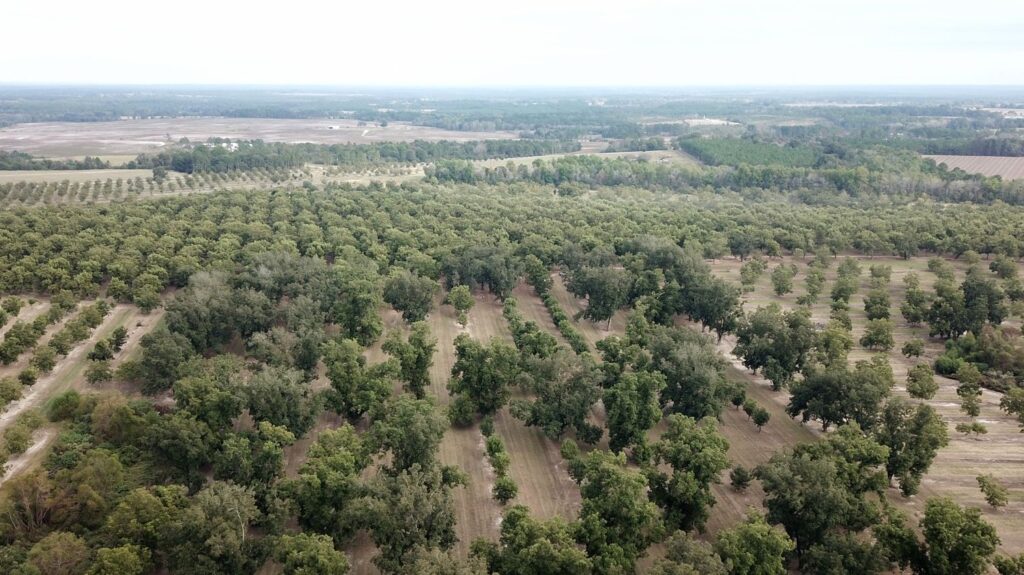/2023/07/07/64a7df4c5fe71_placeholder-36b69ec8.png)
Published
Reading time: 5min
/2025/04/02/051-xxjpbee007272-20191028-pepfn0a001-67eccdb9846f1404807184.jpg)
The state of Georgia which gave the majority to Donald Trump to the last presidential election is also an agricultural state which exports a lot abroad, in particular pecan nuts.
The customs duties imposed by the United States of Donald Trump on many products imported on the American market, come into force on Wednesday April 2. For their part, the countries affected by these customs rights set up their own customs barriers against certain American products.
Georgia, in the south-east of the United States, a pro-Trump and agricultural state which sells a lot abroad, is expected to undergo the consequences of this trade war.
Georgia exports cotton, peanuts or poultry but it is also the American state that produces and exports the most pecan, emblematic culture found in the south of the State, very rural and very conservative areas. In the orchard of Cody Casey, in Hawkinsville, agricultural workers are busy doing the big spring cleaning between the trees, on a small farm, launched tens ten years ago. “We chose to plant a variety that is made for export to China. But with the two mandates of Trump and the customs taxes that were imposed, we could not export as much as we would have liked so we had to sell on the American market.”
Eight years ago, Donald Trump had already launched commercial hostilities with China, one of the historic importers of American pecan. Beijing, this time again, replied by increased customs duties, in this case 52%, four times more than last year: “It’s a lot, yes! The last time we had this kind of customs duties, we had gone from a selling price of two dollars per book, to 1.35 dollars.”
The fear is that it is the same thing this year. So Cody may say conservative, in his ideas, he does not support Donald Trump and it is rather rare in his environment: “I cannot say that I agree with Trump. I supported certain things he had done during his first mandate. But customs duties really harm farmers.”
But the rest of the sector is not necessarily of the same opinion. Franceinfo went to the annual conference of Georgia Pécan producers, a large exhibition hall with huge demonstration agricultural machines, under an American flag also very imposing and in an atmosphere provided by a country singer. Between two stands, Mike Horn, producer from father to son, spontaneously describes himself as “Very conservative”.
When asked what he thinks of the policy led by Donald Trump, no hesitation, Mike is “Very happy with the management that its president gives to the country”. Starting with this all -round pressure put in commercial negotiations, with China but also allied countries such as Europeans, Canada or Mexico : “It’s always a problem when something weakens our agriculture. But I find that we have let other countries take advantage of us for too long.”
“I want us to really defend our interests and if for that, I have to go through difficult times, I accept it!”
Mike Horn, producer of pecanin franceinfo
An American farmer ready to pay the price of aggressive commercial policy, led by Donald Trump, is a speech that we hear a lot among the president’s supporters. This idea that there is bound to be a bad time to spend if you want to shake up the established order and put the interests of the Americans in the foreground in the longest term.
But all the same, beware of agriculture is not the big loser in this policy, to the detriment of American industry, says Jeff Childress. He is one of the biggest georgia pecan producers: “No one is happy with customs duties but next to that there are positive changes for us in administration, in particular the environmental agency which is unrected. It compensates. There were a lot of bad things for farmers in the previous administration but there was no customs duties.”
Deregulation, to lower environmental standards in particular to allow farmers to produce more is how the sector hopes to recover from losses due to customs duties. But on the other hand, many fertilizers and chemicals are imported from Canada, China, and will also cost more because of the trade war. To continue the new golden age that Donald Trump sells them, farmers are now hanging up on the subsidies that are promised to survive the crisis that promises to be.


